Business Law and Ethics: Contractual Rights and Remedies Analysis
VerifiedAdded on 2023/06/18
|7
|2126
|262
Essay
AI Summary
This essay provides a comprehensive analysis of contract law through two case studies. The first case focuses on contractual advice during business negotiations, outlining the rights and responsibilities of parties involved in a contract, including offer, acceptance, and revocation. The second case examines the rights and remedies available to the acceptor of an offer in the event of non-fulfillment of contractual terms, particularly in the context of agency law and partly executed contracts. The essay references relevant legal principles and concludes by emphasizing the importance of understanding contract law for effective business operations and dispute resolution.
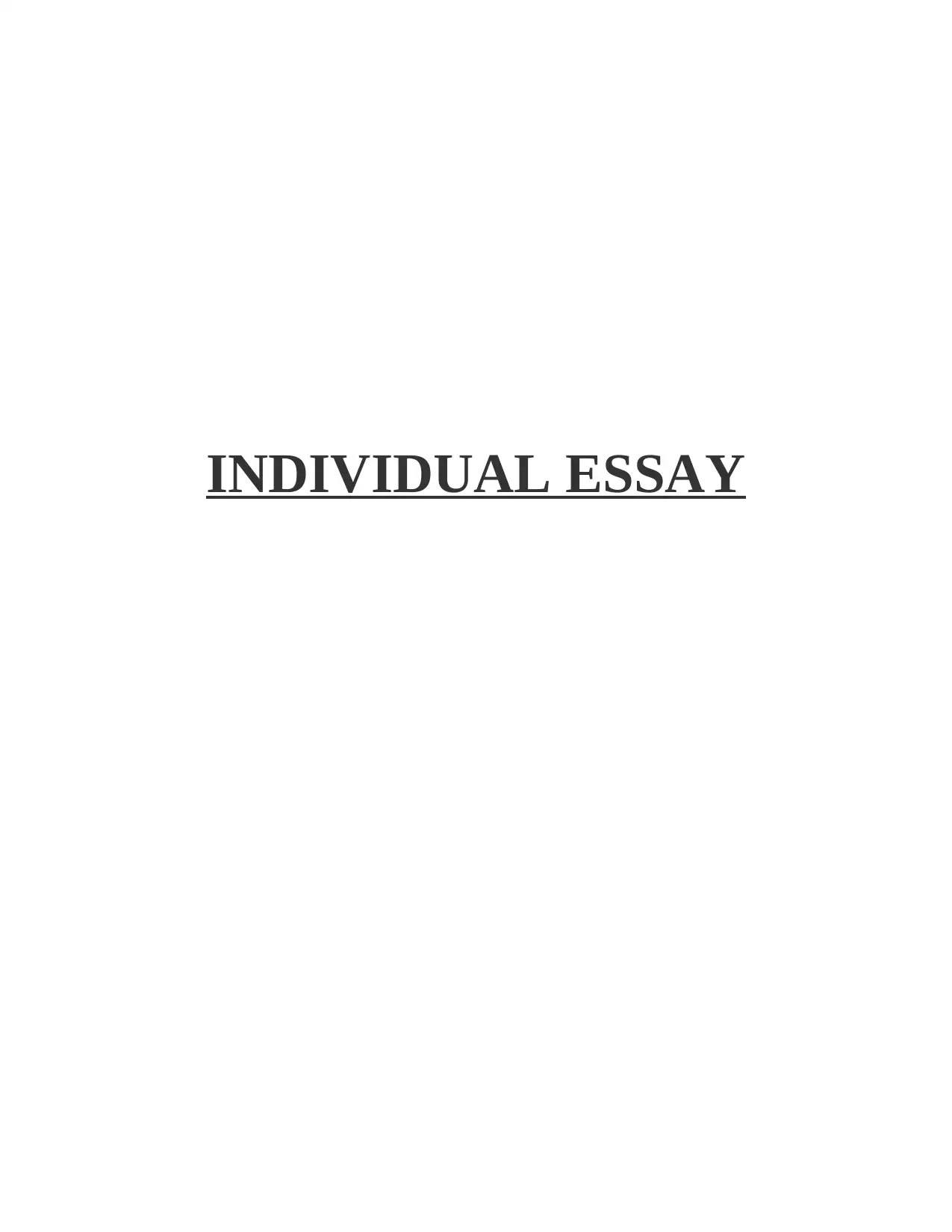
INDIVIDUAL ESSAY
Paraphrase This Document
Need a fresh take? Get an instant paraphrase of this document with our AI Paraphraser
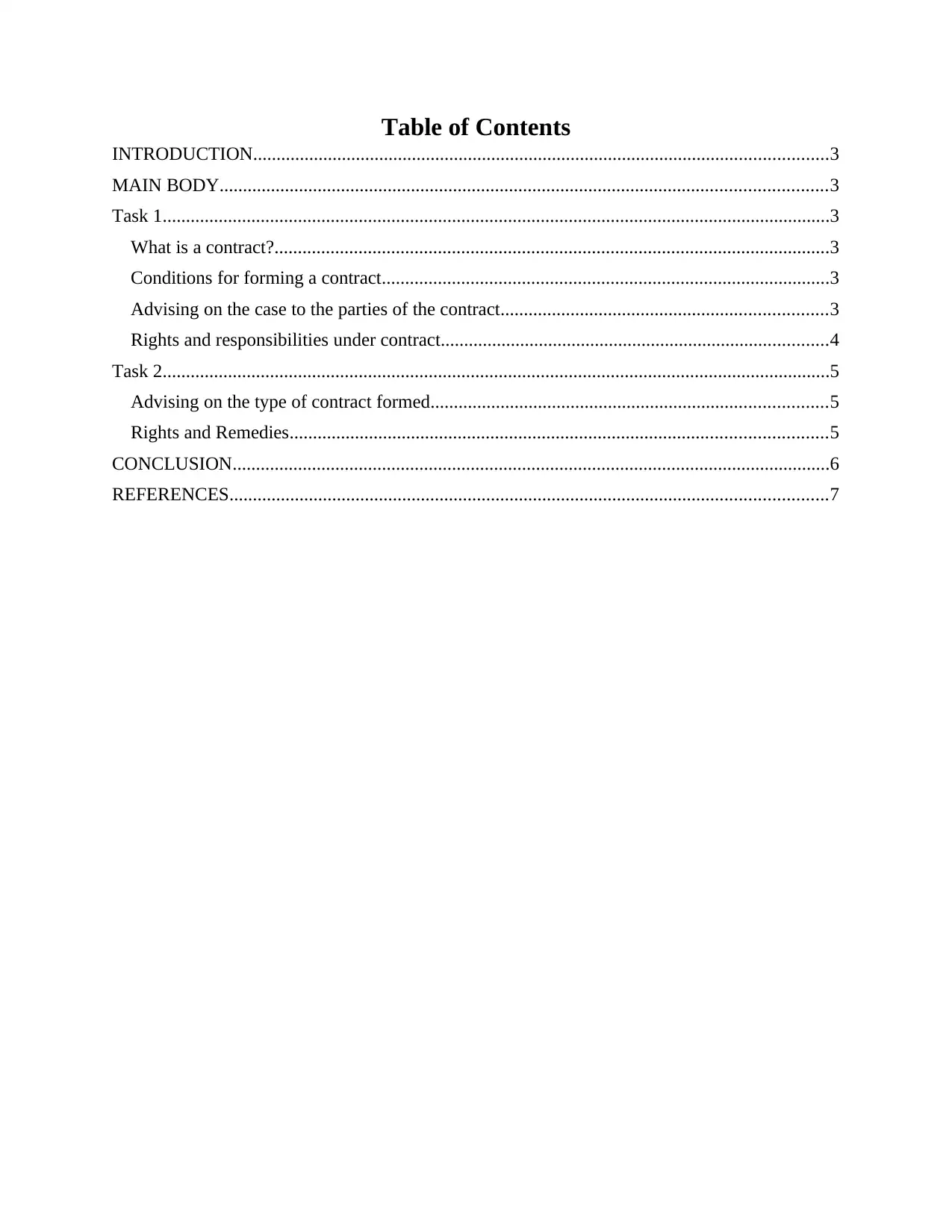
Table of Contents
INTRODUCTION...........................................................................................................................3
MAIN BODY..................................................................................................................................3
Task 1...............................................................................................................................................3
What is a contract?.......................................................................................................................3
Conditions for forming a contract................................................................................................3
Advising on the case to the parties of the contract......................................................................3
Rights and responsibilities under contract...................................................................................4
Task 2...............................................................................................................................................5
Advising on the type of contract formed.....................................................................................5
Rights and Remedies...................................................................................................................5
CONCLUSION................................................................................................................................6
REFERENCES................................................................................................................................7
INTRODUCTION...........................................................................................................................3
MAIN BODY..................................................................................................................................3
Task 1...............................................................................................................................................3
What is a contract?.......................................................................................................................3
Conditions for forming a contract................................................................................................3
Advising on the case to the parties of the contract......................................................................3
Rights and responsibilities under contract...................................................................................4
Task 2...............................................................................................................................................5
Advising on the type of contract formed.....................................................................................5
Rights and Remedies...................................................................................................................5
CONCLUSION................................................................................................................................6
REFERENCES................................................................................................................................7
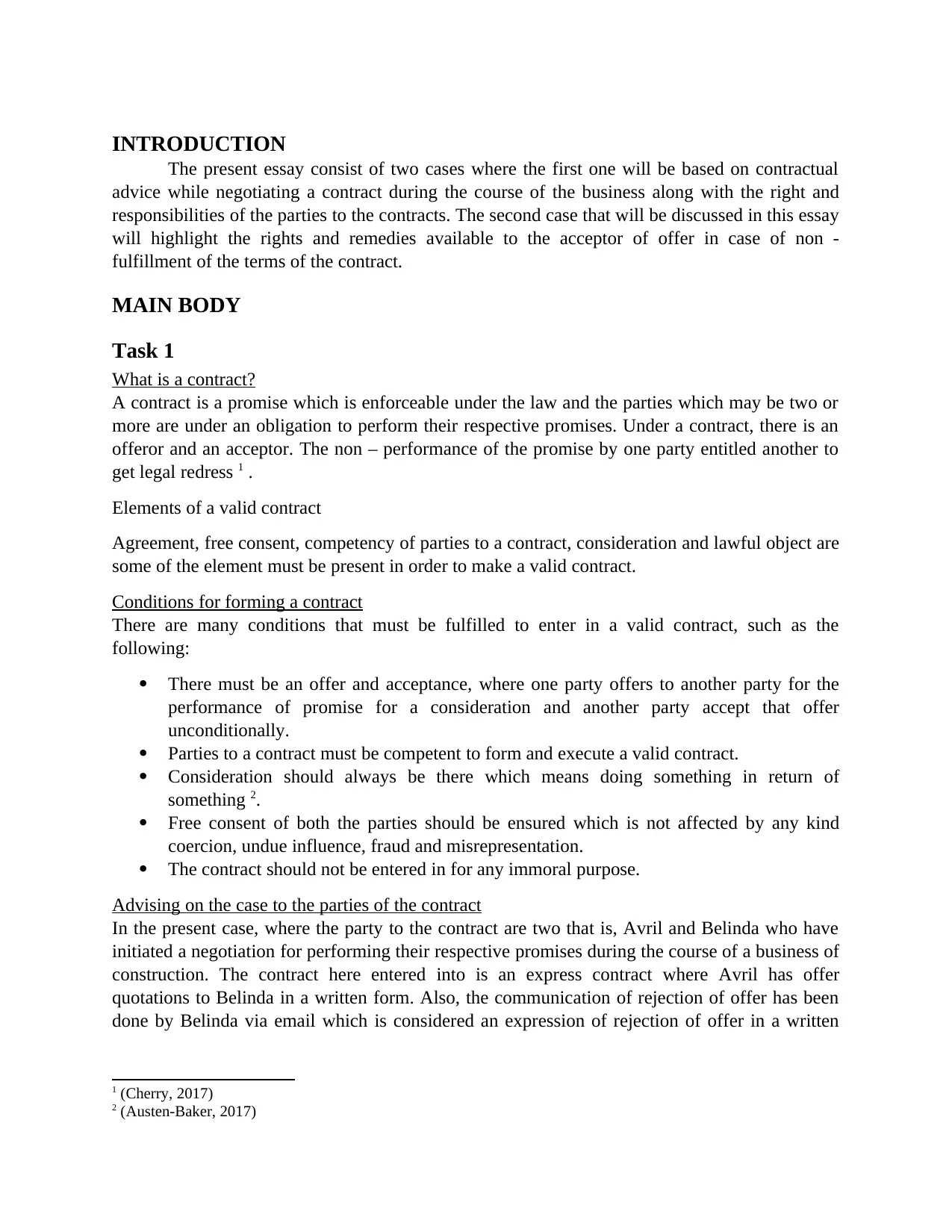
INTRODUCTION
The present essay consist of two cases where the first one will be based on contractual
advice while negotiating a contract during the course of the business along with the right and
responsibilities of the parties to the contracts. The second case that will be discussed in this essay
will highlight the rights and remedies available to the acceptor of offer in case of non -
fulfillment of the terms of the contract.
MAIN BODY
Task 1
What is a contract?
A contract is a promise which is enforceable under the law and the parties which may be two or
more are under an obligation to perform their respective promises. Under a contract, there is an
offeror and an acceptor. The non – performance of the promise by one party entitled another to
get legal redress 1 .
Elements of a valid contract
Agreement, free consent, competency of parties to a contract, consideration and lawful object are
some of the element must be present in order to make a valid contract.
Conditions for forming a contract
There are many conditions that must be fulfilled to enter in a valid contract, such as the
following:
There must be an offer and acceptance, where one party offers to another party for the
performance of promise for a consideration and another party accept that offer
unconditionally.
Parties to a contract must be competent to form and execute a valid contract.
Consideration should always be there which means doing something in return of
something 2.
Free consent of both the parties should be ensured which is not affected by any kind
coercion, undue influence, fraud and misrepresentation.
The contract should not be entered in for any immoral purpose.
Advising on the case to the parties of the contract
In the present case, where the party to the contract are two that is, Avril and Belinda who have
initiated a negotiation for performing their respective promises during the course of a business of
construction. The contract here entered into is an express contract where Avril has offer
quotations to Belinda in a written form. Also, the communication of rejection of offer has been
done by Belinda via email which is considered an expression of rejection of offer in a written
1 (Cherry, 2017)
2 (Austen-Baker, 2017)
The present essay consist of two cases where the first one will be based on contractual
advice while negotiating a contract during the course of the business along with the right and
responsibilities of the parties to the contracts. The second case that will be discussed in this essay
will highlight the rights and remedies available to the acceptor of offer in case of non -
fulfillment of the terms of the contract.
MAIN BODY
Task 1
What is a contract?
A contract is a promise which is enforceable under the law and the parties which may be two or
more are under an obligation to perform their respective promises. Under a contract, there is an
offeror and an acceptor. The non – performance of the promise by one party entitled another to
get legal redress 1 .
Elements of a valid contract
Agreement, free consent, competency of parties to a contract, consideration and lawful object are
some of the element must be present in order to make a valid contract.
Conditions for forming a contract
There are many conditions that must be fulfilled to enter in a valid contract, such as the
following:
There must be an offer and acceptance, where one party offers to another party for the
performance of promise for a consideration and another party accept that offer
unconditionally.
Parties to a contract must be competent to form and execute a valid contract.
Consideration should always be there which means doing something in return of
something 2.
Free consent of both the parties should be ensured which is not affected by any kind
coercion, undue influence, fraud and misrepresentation.
The contract should not be entered in for any immoral purpose.
Advising on the case to the parties of the contract
In the present case, where the party to the contract are two that is, Avril and Belinda who have
initiated a negotiation for performing their respective promises during the course of a business of
construction. The contract here entered into is an express contract where Avril has offer
quotations to Belinda in a written form. Also, the communication of rejection of offer has been
done by Belinda via email which is considered an expression of rejection of offer in a written
1 (Cherry, 2017)
2 (Austen-Baker, 2017)
⊘ This is a preview!⊘
Do you want full access?
Subscribe today to unlock all pages.

Trusted by 1+ million students worldwide
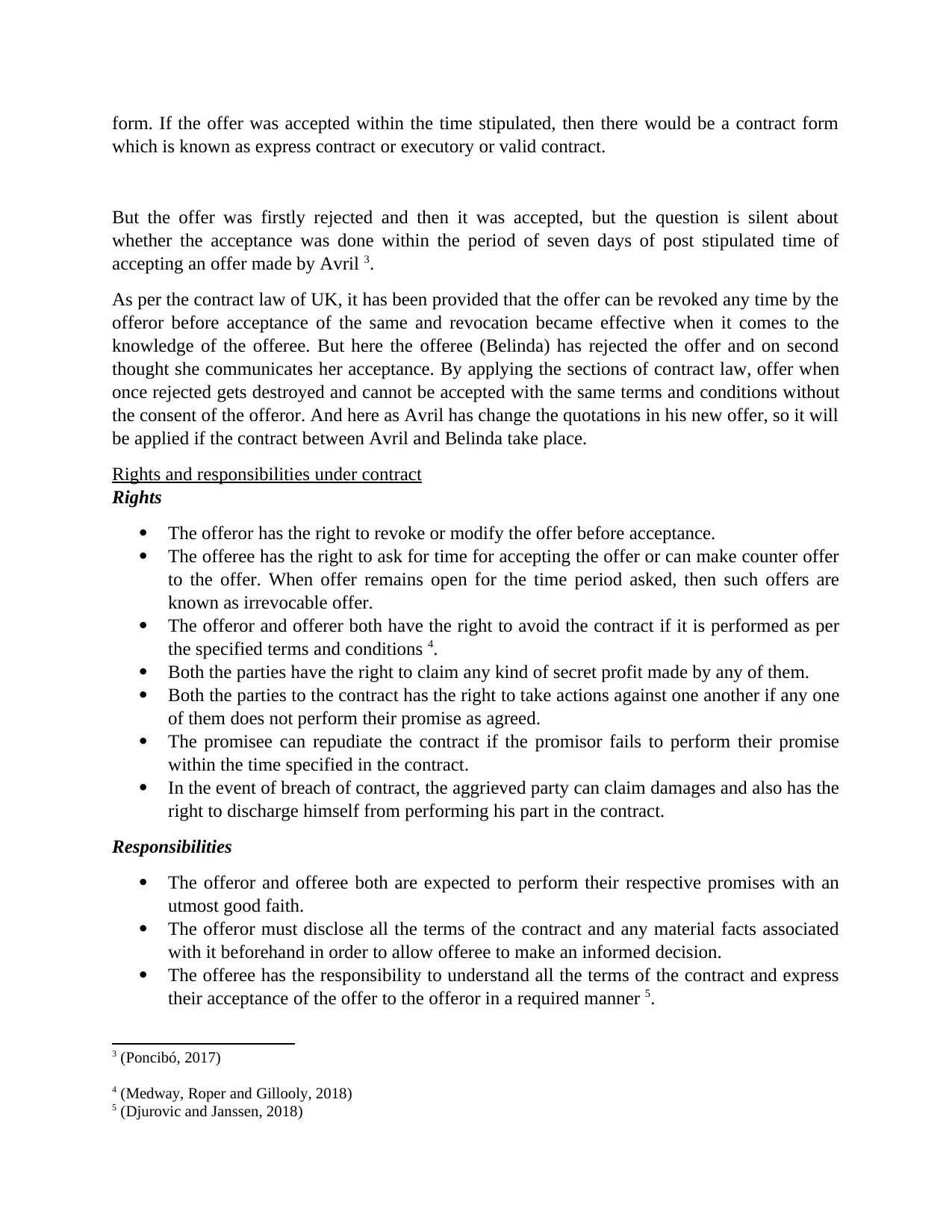
form. If the offer was accepted within the time stipulated, then there would be a contract form
which is known as express contract or executory or valid contract.
But the offer was firstly rejected and then it was accepted, but the question is silent about
whether the acceptance was done within the period of seven days of post stipulated time of
accepting an offer made by Avril 3.
As per the contract law of UK, it has been provided that the offer can be revoked any time by the
offeror before acceptance of the same and revocation became effective when it comes to the
knowledge of the offeree. But here the offeree (Belinda) has rejected the offer and on second
thought she communicates her acceptance. By applying the sections of contract law, offer when
once rejected gets destroyed and cannot be accepted with the same terms and conditions without
the consent of the offeror. And here as Avril has change the quotations in his new offer, so it will
be applied if the contract between Avril and Belinda take place.
Rights and responsibilities under contract
Rights
The offeror has the right to revoke or modify the offer before acceptance.
The offeree has the right to ask for time for accepting the offer or can make counter offer
to the offer. When offer remains open for the time period asked, then such offers are
known as irrevocable offer.
The offeror and offerer both have the right to avoid the contract if it is performed as per
the specified terms and conditions 4.
Both the parties have the right to claim any kind of secret profit made by any of them.
Both the parties to the contract has the right to take actions against one another if any one
of them does not perform their promise as agreed.
The promisee can repudiate the contract if the promisor fails to perform their promise
within the time specified in the contract.
In the event of breach of contract, the aggrieved party can claim damages and also has the
right to discharge himself from performing his part in the contract.
Responsibilities
The offeror and offeree both are expected to perform their respective promises with an
utmost good faith.
The offeror must disclose all the terms of the contract and any material facts associated
with it beforehand in order to allow offeree to make an informed decision.
The offeree has the responsibility to understand all the terms of the contract and express
their acceptance of the offer to the offeror in a required manner 5.
3 (Poncibó, 2017)
4 (Medway, Roper and Gillooly, 2018)
5 (Djurovic and Janssen, 2018)
which is known as express contract or executory or valid contract.
But the offer was firstly rejected and then it was accepted, but the question is silent about
whether the acceptance was done within the period of seven days of post stipulated time of
accepting an offer made by Avril 3.
As per the contract law of UK, it has been provided that the offer can be revoked any time by the
offeror before acceptance of the same and revocation became effective when it comes to the
knowledge of the offeree. But here the offeree (Belinda) has rejected the offer and on second
thought she communicates her acceptance. By applying the sections of contract law, offer when
once rejected gets destroyed and cannot be accepted with the same terms and conditions without
the consent of the offeror. And here as Avril has change the quotations in his new offer, so it will
be applied if the contract between Avril and Belinda take place.
Rights and responsibilities under contract
Rights
The offeror has the right to revoke or modify the offer before acceptance.
The offeree has the right to ask for time for accepting the offer or can make counter offer
to the offer. When offer remains open for the time period asked, then such offers are
known as irrevocable offer.
The offeror and offerer both have the right to avoid the contract if it is performed as per
the specified terms and conditions 4.
Both the parties have the right to claim any kind of secret profit made by any of them.
Both the parties to the contract has the right to take actions against one another if any one
of them does not perform their promise as agreed.
The promisee can repudiate the contract if the promisor fails to perform their promise
within the time specified in the contract.
In the event of breach of contract, the aggrieved party can claim damages and also has the
right to discharge himself from performing his part in the contract.
Responsibilities
The offeror and offeree both are expected to perform their respective promises with an
utmost good faith.
The offeror must disclose all the terms of the contract and any material facts associated
with it beforehand in order to allow offeree to make an informed decision.
The offeree has the responsibility to understand all the terms of the contract and express
their acceptance of the offer to the offeror in a required manner 5.
3 (Poncibó, 2017)
4 (Medway, Roper and Gillooly, 2018)
5 (Djurovic and Janssen, 2018)
Paraphrase This Document
Need a fresh take? Get an instant paraphrase of this document with our AI Paraphraser
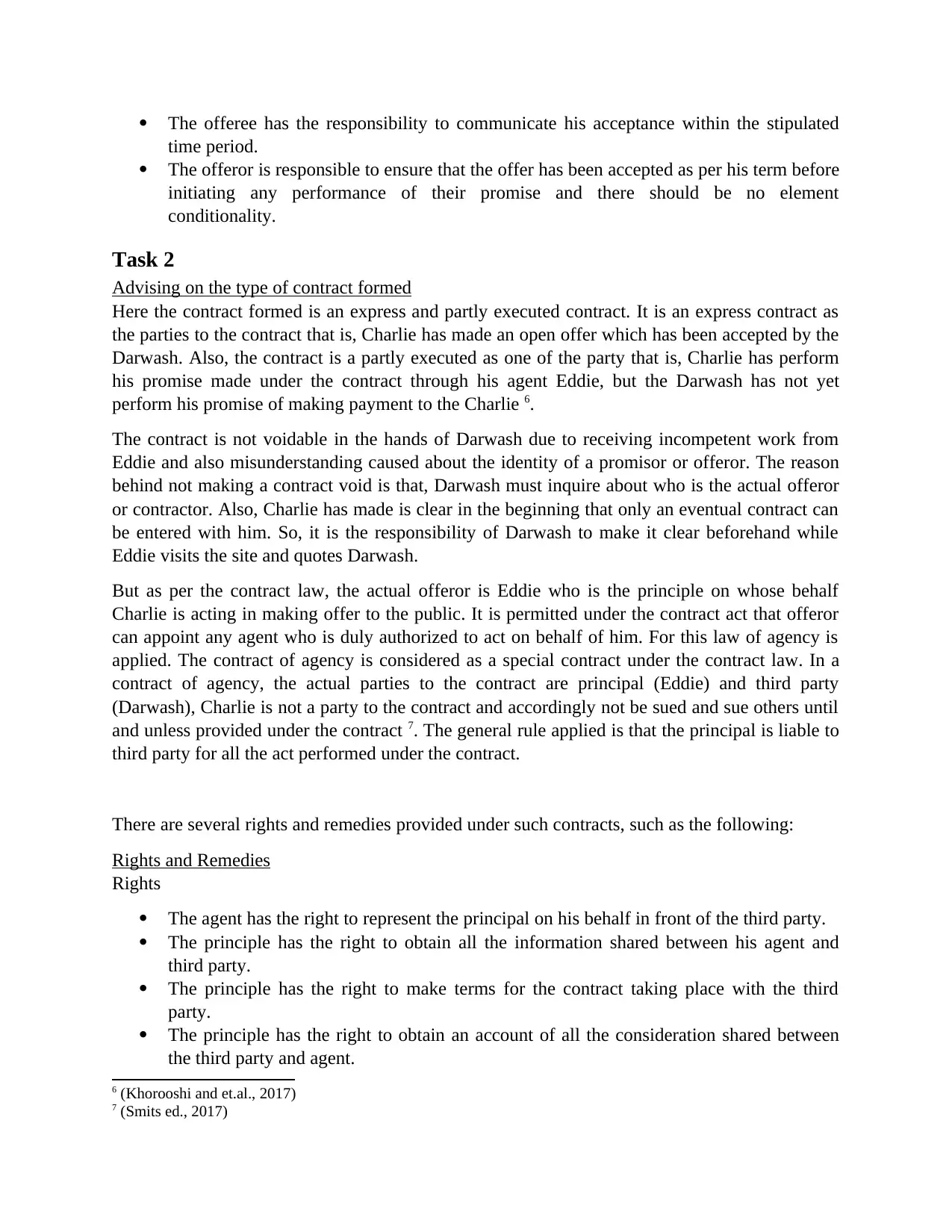
The offeree has the responsibility to communicate his acceptance within the stipulated
time period.
The offeror is responsible to ensure that the offer has been accepted as per his term before
initiating any performance of their promise and there should be no element
conditionality.
Task 2
Advising on the type of contract formed
Here the contract formed is an express and partly executed contract. It is an express contract as
the parties to the contract that is, Charlie has made an open offer which has been accepted by the
Darwash. Also, the contract is a partly executed as one of the party that is, Charlie has perform
his promise made under the contract through his agent Eddie, but the Darwash has not yet
perform his promise of making payment to the Charlie 6.
The contract is not voidable in the hands of Darwash due to receiving incompetent work from
Eddie and also misunderstanding caused about the identity of a promisor or offeror. The reason
behind not making a contract void is that, Darwash must inquire about who is the actual offeror
or contractor. Also, Charlie has made is clear in the beginning that only an eventual contract can
be entered with him. So, it is the responsibility of Darwash to make it clear beforehand while
Eddie visits the site and quotes Darwash.
But as per the contract law, the actual offeror is Eddie who is the principle on whose behalf
Charlie is acting in making offer to the public. It is permitted under the contract act that offeror
can appoint any agent who is duly authorized to act on behalf of him. For this law of agency is
applied. The contract of agency is considered as a special contract under the contract law. In a
contract of agency, the actual parties to the contract are principal (Eddie) and third party
(Darwash), Charlie is not a party to the contract and accordingly not be sued and sue others until
and unless provided under the contract 7. The general rule applied is that the principal is liable to
third party for all the act performed under the contract.
There are several rights and remedies provided under such contracts, such as the following:
Rights and Remedies
Rights
The agent has the right to represent the principal on his behalf in front of the third party.
The principle has the right to obtain all the information shared between his agent and
third party.
The principle has the right to make terms for the contract taking place with the third
party.
The principle has the right to obtain an account of all the consideration shared between
the third party and agent.
6 (Khorooshi and et.al., 2017)
7 (Smits ed., 2017)
time period.
The offeror is responsible to ensure that the offer has been accepted as per his term before
initiating any performance of their promise and there should be no element
conditionality.
Task 2
Advising on the type of contract formed
Here the contract formed is an express and partly executed contract. It is an express contract as
the parties to the contract that is, Charlie has made an open offer which has been accepted by the
Darwash. Also, the contract is a partly executed as one of the party that is, Charlie has perform
his promise made under the contract through his agent Eddie, but the Darwash has not yet
perform his promise of making payment to the Charlie 6.
The contract is not voidable in the hands of Darwash due to receiving incompetent work from
Eddie and also misunderstanding caused about the identity of a promisor or offeror. The reason
behind not making a contract void is that, Darwash must inquire about who is the actual offeror
or contractor. Also, Charlie has made is clear in the beginning that only an eventual contract can
be entered with him. So, it is the responsibility of Darwash to make it clear beforehand while
Eddie visits the site and quotes Darwash.
But as per the contract law, the actual offeror is Eddie who is the principle on whose behalf
Charlie is acting in making offer to the public. It is permitted under the contract act that offeror
can appoint any agent who is duly authorized to act on behalf of him. For this law of agency is
applied. The contract of agency is considered as a special contract under the contract law. In a
contract of agency, the actual parties to the contract are principal (Eddie) and third party
(Darwash), Charlie is not a party to the contract and accordingly not be sued and sue others until
and unless provided under the contract 7. The general rule applied is that the principal is liable to
third party for all the act performed under the contract.
There are several rights and remedies provided under such contracts, such as the following:
Rights and Remedies
Rights
The agent has the right to represent the principal on his behalf in front of the third party.
The principle has the right to obtain all the information shared between his agent and
third party.
The principle has the right to make terms for the contract taking place with the third
party.
The principle has the right to obtain an account of all the consideration shared between
the third party and agent.
6 (Khorooshi and et.al., 2017)
7 (Smits ed., 2017)
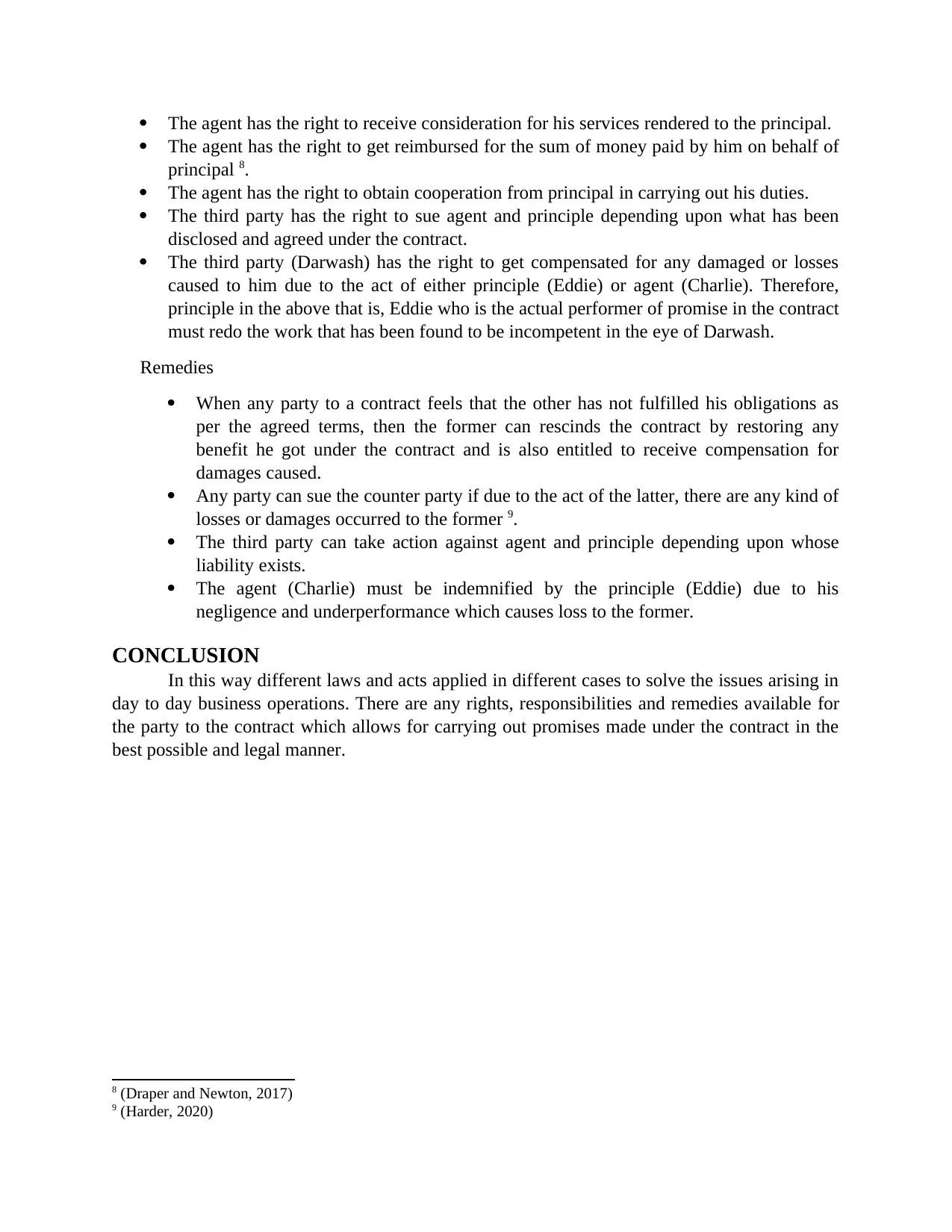
The agent has the right to receive consideration for his services rendered to the principal.
The agent has the right to get reimbursed for the sum of money paid by him on behalf of
principal 8.
The agent has the right to obtain cooperation from principal in carrying out his duties.
The third party has the right to sue agent and principle depending upon what has been
disclosed and agreed under the contract.
The third party (Darwash) has the right to get compensated for any damaged or losses
caused to him due to the act of either principle (Eddie) or agent (Charlie). Therefore,
principle in the above that is, Eddie who is the actual performer of promise in the contract
must redo the work that has been found to be incompetent in the eye of Darwash.
Remedies
When any party to a contract feels that the other has not fulfilled his obligations as
per the agreed terms, then the former can rescinds the contract by restoring any
benefit he got under the contract and is also entitled to receive compensation for
damages caused.
Any party can sue the counter party if due to the act of the latter, there are any kind of
losses or damages occurred to the former 9.
The third party can take action against agent and principle depending upon whose
liability exists.
The agent (Charlie) must be indemnified by the principle (Eddie) due to his
negligence and underperformance which causes loss to the former.
CONCLUSION
In this way different laws and acts applied in different cases to solve the issues arising in
day to day business operations. There are any rights, responsibilities and remedies available for
the party to the contract which allows for carrying out promises made under the contract in the
best possible and legal manner.
8 (Draper and Newton, 2017)
9 (Harder, 2020)
The agent has the right to get reimbursed for the sum of money paid by him on behalf of
principal 8.
The agent has the right to obtain cooperation from principal in carrying out his duties.
The third party has the right to sue agent and principle depending upon what has been
disclosed and agreed under the contract.
The third party (Darwash) has the right to get compensated for any damaged or losses
caused to him due to the act of either principle (Eddie) or agent (Charlie). Therefore,
principle in the above that is, Eddie who is the actual performer of promise in the contract
must redo the work that has been found to be incompetent in the eye of Darwash.
Remedies
When any party to a contract feels that the other has not fulfilled his obligations as
per the agreed terms, then the former can rescinds the contract by restoring any
benefit he got under the contract and is also entitled to receive compensation for
damages caused.
Any party can sue the counter party if due to the act of the latter, there are any kind of
losses or damages occurred to the former 9.
The third party can take action against agent and principle depending upon whose
liability exists.
The agent (Charlie) must be indemnified by the principle (Eddie) due to his
negligence and underperformance which causes loss to the former.
CONCLUSION
In this way different laws and acts applied in different cases to solve the issues arising in
day to day business operations. There are any rights, responsibilities and remedies available for
the party to the contract which allows for carrying out promises made under the contract in the
best possible and legal manner.
8 (Draper and Newton, 2017)
9 (Harder, 2020)
⊘ This is a preview!⊘
Do you want full access?
Subscribe today to unlock all pages.

Trusted by 1+ million students worldwide
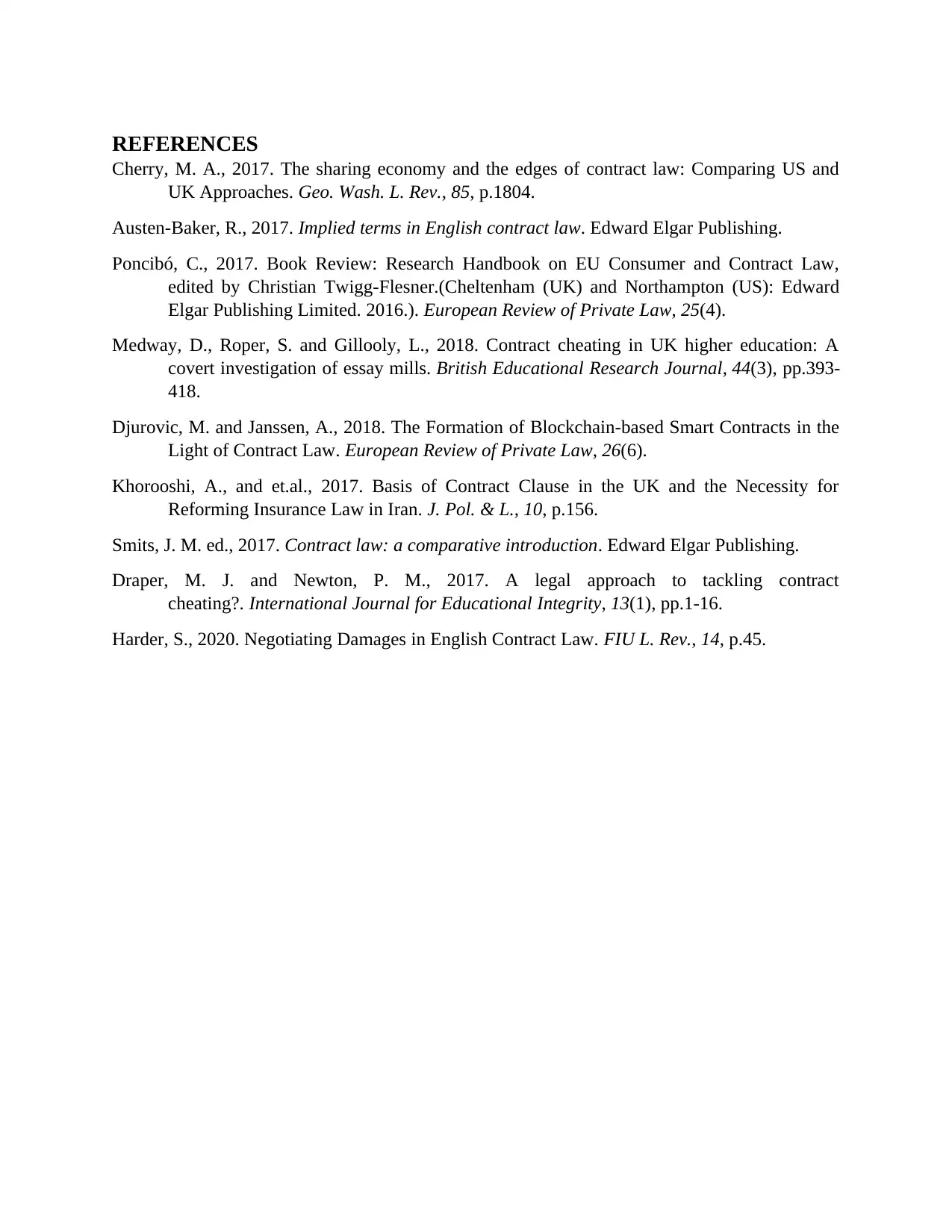
REFERENCES
Cherry, M. A., 2017. The sharing economy and the edges of contract law: Comparing US and
UK Approaches. Geo. Wash. L. Rev., 85, p.1804.
Austen-Baker, R., 2017. Implied terms in English contract law. Edward Elgar Publishing.
Poncibó, C., 2017. Book Review: Research Handbook on EU Consumer and Contract Law,
edited by Christian Twigg-Flesner.(Cheltenham (UK) and Northampton (US): Edward
Elgar Publishing Limited. 2016.). European Review of Private Law, 25(4).
Medway, D., Roper, S. and Gillooly, L., 2018. Contract cheating in UK higher education: A
covert investigation of essay mills. British Educational Research Journal, 44(3), pp.393-
418.
Djurovic, M. and Janssen, A., 2018. The Formation of Blockchain-based Smart Contracts in the
Light of Contract Law. European Review of Private Law, 26(6).
Khorooshi, A., and et.al., 2017. Basis of Contract Clause in the UK and the Necessity for
Reforming Insurance Law in Iran. J. Pol. & L., 10, p.156.
Smits, J. M. ed., 2017. Contract law: a comparative introduction. Edward Elgar Publishing.
Draper, M. J. and Newton, P. M., 2017. A legal approach to tackling contract
cheating?. International Journal for Educational Integrity, 13(1), pp.1-16.
Harder, S., 2020. Negotiating Damages in English Contract Law. FIU L. Rev., 14, p.45.
Cherry, M. A., 2017. The sharing economy and the edges of contract law: Comparing US and
UK Approaches. Geo. Wash. L. Rev., 85, p.1804.
Austen-Baker, R., 2017. Implied terms in English contract law. Edward Elgar Publishing.
Poncibó, C., 2017. Book Review: Research Handbook on EU Consumer and Contract Law,
edited by Christian Twigg-Flesner.(Cheltenham (UK) and Northampton (US): Edward
Elgar Publishing Limited. 2016.). European Review of Private Law, 25(4).
Medway, D., Roper, S. and Gillooly, L., 2018. Contract cheating in UK higher education: A
covert investigation of essay mills. British Educational Research Journal, 44(3), pp.393-
418.
Djurovic, M. and Janssen, A., 2018. The Formation of Blockchain-based Smart Contracts in the
Light of Contract Law. European Review of Private Law, 26(6).
Khorooshi, A., and et.al., 2017. Basis of Contract Clause in the UK and the Necessity for
Reforming Insurance Law in Iran. J. Pol. & L., 10, p.156.
Smits, J. M. ed., 2017. Contract law: a comparative introduction. Edward Elgar Publishing.
Draper, M. J. and Newton, P. M., 2017. A legal approach to tackling contract
cheating?. International Journal for Educational Integrity, 13(1), pp.1-16.
Harder, S., 2020. Negotiating Damages in English Contract Law. FIU L. Rev., 14, p.45.
1 out of 7
Related Documents
Your All-in-One AI-Powered Toolkit for Academic Success.
+13062052269
info@desklib.com
Available 24*7 on WhatsApp / Email
![[object Object]](/_next/static/media/star-bottom.7253800d.svg)
Unlock your academic potential
Copyright © 2020–2026 A2Z Services. All Rights Reserved. Developed and managed by ZUCOL.





